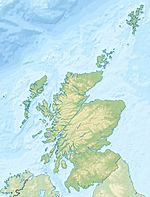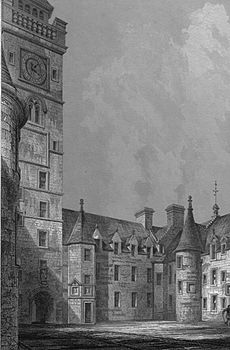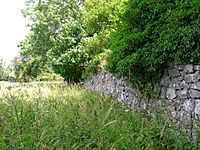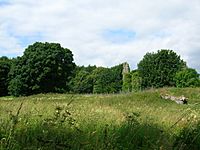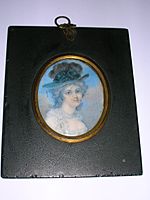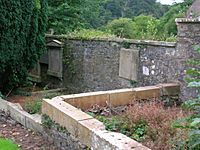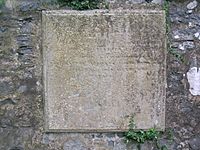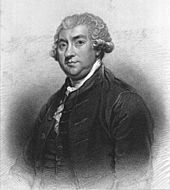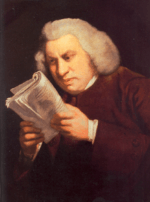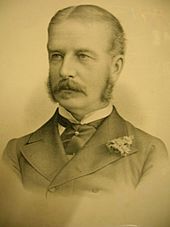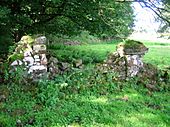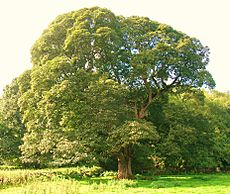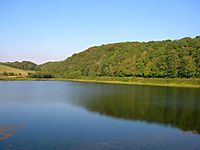Auchans Castle, Ayrshire facts for kids
Quick facts for kids Auchans Castle |
|
|---|---|
| Craigie, South Ayrshire, Scotland UK |
|
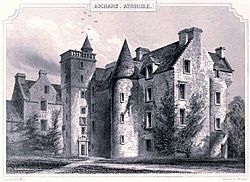
Auchans in the 19th century
|
|
| Coordinates | 55°34′38″N 4°36′41″W / 55.577185°N 4.611292°W |
| Type | Mock military mansion |
| Site information | |
| Owner | Mr R Vernon, Hillhouse |
| Controlled by | Montgomery clan Wallace Clan Cochrane Clan |
| Open to the public |
Private |
| Condition | Ruin |
| Site history | |
| Built | 16th century |
| Built by | Sir William Cochrane |
| In use | Until 19th century |
| Materials | Whinstone and freestone |
Auchans Castle is an old building that looks like a military mansion. It was built in the late 1500s and changed a bit in the 1600s. Today, it stands as a ruin about 1 kilometer west of Dundonald, in South Ayrshire, Scotland. Over the years, different important families owned it, including the Wallace, Cochrane, and Montgomerie clans.
Contents
What Does Auchans Castle Look Like?
Auchans Castle is considered one of Scotland's main "châteaux." A château is a large, beautiful country house owned by someone with a lot of land. In 1644, James Wallace added a fancy square stair-tower. This tower had a viewing platform and decorative carvings. On an old map from 1654, the castle's name was spelled 'Aghans'.
The castle sits on a small hill and is mostly made of a strong stone called whinstone. It used to have three main floors. The bottom floor had a vaulted ceiling, which means it was built with arched supports. A new part was added later on the west side. This new section had a stair-tower with a Renaissance-style doorway.
The kitchen was in the western part of the castle. The first floor had important rooms, including a dining room. This room was covered in wood panels and had a beautiful marble fireplace. The upper floors had bedrooms and a long gallery. This gallery was a long, narrow room, often used for walking or displaying art.
Some stones in the castle ruins have dates carved into them, like '1644' and '1667'. Other stones have initials, 'W C' and 'E S'. These likely stand for Sir William Cochrane and his wife Eupheme Scott, who were important owners.
The castle is now very ruined. It stands in a wooded area with old stone walls that are mostly falling apart. Much of the stone used to build Auchans and its walls came from Dundonald Castle. In the 1880s, many valuable family papers were found in the castle. They were saved just as the building was falling apart. Sadly, many papers had already been lost due to neglect.
The Auchans Pear and Gardens
Auchans Castle once had beautiful flower gardens inside a walled area. In 1875, this garden was still being used. It was home to the original tree of the famous Auchans pear. This special pear tree was brought from France (or Norway) a long time ago. Some say it was during the time of Mary, Queen of Scots. The tree grew very tall but was blown down in a storm in 1793.
In 2003, some pears from Pluscarden Abbey were identified as the Black Aachen or Auchans pear. The Auchans pear might have gotten its name from the castle. It's described as a lumpy, brownish-red pear that looks "ugly as a toad." But don't let its looks fool you! The fruit is "tender, buttery, juicy, sugary, with a rich and aromatic flavour." Auchans pears are considered excellent dessert pears. They are ripe in November and December. The trees produce a lot of fruit, especially as they get older.
The castle grounds also had an artificial lake filled with fish. There was also a deer park, where deer were kept. The woods around the castle were very old and known for having lots of game animals. An old map from the mid-1800s shows a rabbit warren in the area.
Who Lived at Auchans Castle?
In 1527, the Wallace family first owned Auchans. Colonel James Wallace was the last Wallace to live there. He was a strong supporter of a group called the Covenanters. He led a rebellion in 1666 and later died in another country in 1678.
In 1640, the estate went to Sir William Cochrane. He was later made the Earl of Dundonald in 1669. The second Earl of Dundonald lived at Auchans with his mother for a while.
After Lady Eglinton passed away in 1780, Auchans was used to house families of workmen. The 11th Earl of Eglinton also lived here for some time. There is a burial ground for Auchans at the Dundonald cemetery. A memorial plaque remembers John Dunlop, who managed the estate for Lady Susanna Montgomery.
By 1846, the castle was becoming very ruined. Only servants lived there, and parts were locked up. Some beautiful features, like marble fireplaces, were moved to a newer house called Auchans House. In 1875, foresters lived on the ground floor, but the roof was still kept in good shape.
In 1892, Lady Sofia Constance Montgomerie inherited the Auchans estate. This included the castle, its grounds, and several farms. During World War I, the building was even used to house German prisoners of war. However, by 1922, most of the roof had fallen in.
At one point, the Earl of Dundonald bought Auchans back. People still try to restore the castle sometimes, and the Clan Wallace Society has shown interest.
Lady Susanna Montgomery: A Special Resident
It was common for a widowed noblewoman to move out of the main family home. Lady Susanna, as the Dowager Countess of Eglinton, moved to Auchans. In 1762, she wrote that her son had given her Auchans House and that she was going to fix it up. After her son Alexander was sadly murdered in 1769, she lived permanently at Auchans for eight years.
Lady Susanna is remembered for something very unusual: she tamed rats! She had ten or twelve rats that would come to her table for food when she tapped on an oak wall panel and opened a small door. They would leave when she told them to. She said she valued the gratitude they showed, which she rarely received from humans.
Famous Visitors: Samuel Johnson and James Boswell
In 1773, two famous writers, James Boswell and Samuel Johnson, visited Lady Susanna at Auchans. When Johnson was leaving, Lady Susanna hugged him. She told him that since she was old enough to be his mother, she would adopt him!
Johnson later wrote about his visit. He described Susanna as "a lady who for many years gave the laws of elegance to Scotland." He said she was still very sharp and looked good, even at 83. She joked that her marriage was in the year 'eight' and his birth was in the year 'nine'. She then said, "Then I am just old enough to be your mother, and I will take you for my son." Johnson said he was sad to leave her.
New Auchans House
A new Auchans House was built around 1819. It was designed to look like an Italian villa. The land around the house was very wooded, and this natural beauty was kept. The driveway was lined with flowers, and there was a large conservatory, like a greenhouse, attached to the house.
The new Auchans House was owned by different people over the years, including the Earl of Eglinton and a banking family. In 1947, the Earl of Eglinton sold it to the Earl of Dundonald. The house was then sold to a builder in 1960 and torn down in 1970. Today, houses stand where the new Auchans House used to be.
It's important to know that the name 'Auchans' has been used for several places over time, which can be confusing! The word 'Auchans' comes from a Scottish Gaelic word meaning 'tilled fields'. This suggests the area was once farmland created by clearing woodlands.
Archaeological Finds
An ancient axe-hammer found near Auchans Castle is now kept in a museum called the Dick Institute in Kilmarnock. Also, a pot (called an urn) containing pieces of human bones was found near the castle. It was discovered by a worker digging in a small gravel mound. The urn was old and fell apart when it was exposed to the air.
Old maps show signs of "rig-and-furrow" cultivation near the castle. This is a pattern of ridges and grooves in fields, showing where crops were grown a long time ago.
Nature Around Auchans
The Dundonald Woods, near Auchans, are one of the largest areas of elm trees in Ayrshire. You can also find ash, oak, and sycamore trees there. Many of the trees were cut down during World War II and have since regrown. There are also some areas with conifer trees.
The area has different types of wet habitats, like springs and an old reservoir. These help make the area rich in different kinds of plants and animals. Some special plants found here include Dog's Mercury and Broad-leaved Helleborine. Even today, the grounds of Auchans Castle have several very old sycamore trees.
Images for kids
See Also
 | Chris Smalls |
 | Fred Hampton |
 | Ralph Abernathy |


